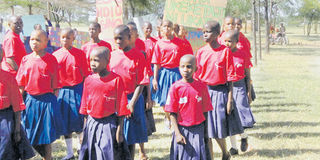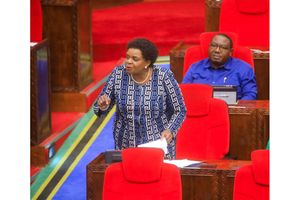Allow teen mothers back to school after delivery: rights body

Primary school pupils march as they mark International Day of the African Child 2017 in Serengeti District, Mara Region, on Friday.
PHOTO|ANTHON MAYUNGA
What you need to know:
Speaking at a press conference as part of the commemoration of International Day of the African Child on Friday, CHRAGG commissioner Salma Hassan said there was no law, which prohibited a teen mother to return to school after delivery.
Dar es Salaam. The Commission for Human Rights and Good Governance (CHRAGG) has called on the government to allow girls, who are impregnated, while at school to continue with their studies after delivery.
Speaking at a press conference as part of the commemoration of International Day of the African Child on Friday, CHRAGG commissioner Salma Hassan said there was no law, which prohibited a teen mother to return to school after delivery.
“This is just a practice because we have gone through the country’s laws and we haven’t found any, which denies a girl from returning to school after delivery,” noted Ms Hassan.
The appeal to allow teen mothers back to school drew heated debate in the National Assembly.
The social services and community development parliamentary committee and opposition asked the House to push for a change in the policy to allow teenage mothers to resume their studies after giving birth.
However, battle lines were drawn in the House, when former First Lady Salma Kikwete (Nominated MP-CCM) declared that she did not support the proposal and urged the government to firmly enforce laws that prohibited sex with minors, instead.
For their part, activists and other stakeholders also used International Day of the African Child to call on the government and other stakeholders to be firm against people or laws, which violated children’s rights.
The Legal and Human Rights Centre (LHRC) called on the government to amend laws that undermined the rights of children, including the Law of Marriage Act, 1971.
In a statement released to the media yesterday, the LHRC said the law had been denying girls their right to education and realise each’s dream academically.
SOS Children’s Villages, an orphanage, urged the government to exercise zero tolerance against people, who violated children’s rights.
“We call on the government to put children’s rights protection on top of its agenda. The government and other stakeholders must invest heavily in children if the country is to secure its future,” said SOS village national director Anatoli Rugaimukamu in a statement released to the media.
The LHRC also reminded the government to improve infrastructure, especially in school to address challenges that girl students encountered and led to early pregnancy, especially in rural areas. “The government should mitigate issues of sexual abuse on children, female genital mutilation (FGM) in different areas in the country, early marriage and others to guarantee them with safety and wellbeing,” the release read.
The theme of year’s International Day of the African Child is Sustainable Development 2030: Strengthen Security and Equal Opportunities for All Children.
According to United Nations Population Fund (UNFPA) 2014 data, underage pregnancy is a global problem as 15 million girls are reported to get married at the age below 18, the average of 41, 000 girls per day.
In Tanzania, according to recent statistics availed by the United Nations Children’s Fund (UNICEF), Shinyanga is reported to have a large number of underage pregnancy cases (59 per cent) followed by Tabora (58 per cent), Mara (55 per cent), Dodoma (51 per cent) and Lindi with 48 per cent.



